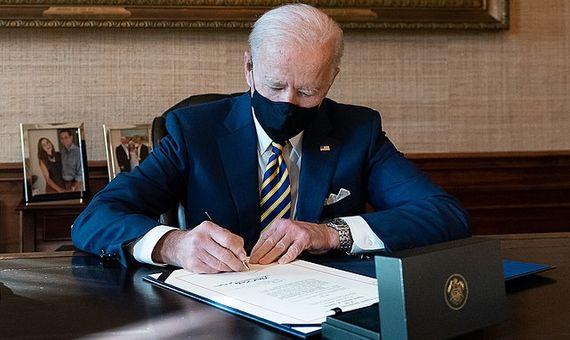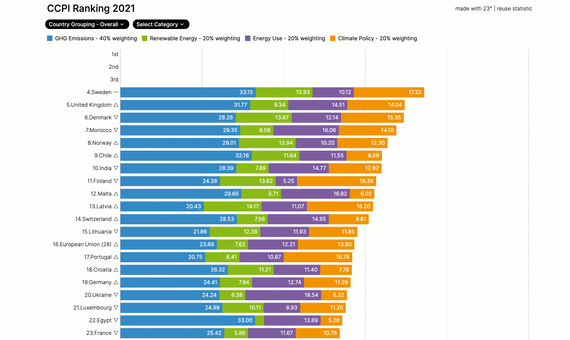The year 2020 was globally, according to data from NASA and Copernicus, the warmest year in history, tied with 2016. It was also the year in which fires devastated Australian forests, floods inundated Indonesia, India, Japan and China, and huge hurricanes hit the coasts of the oceans. In the Atlantic, there were so many tropical cyclones that the alphabetical list of names ran out and the National Hurricane Center had to resort to using letters from the Greek alphabet to name them. And these natural disasters will only increase as one of humanity’s most vexing challenges—climate change—worsens. But 2020 also brought hopeful news with the changeover of the US presidency that heralded a return of the world’s leading power to the path of fighting climate change. Will the US be able to regain a leading position in this global cause?

In 2017, less than two years after the adoption of the Paris Agreement, which sets global targets to curb climate change, then US President Donald Trump announced his intention to abandon it, signalling his country’s renunciation of its leadership role in this vital global transformation. Faced with the vacuum left by the US, the political leaders of different countries, such as France, India and Canada, or the UN itself—through its secretary general, Antonio Guterres—emerged as candidates to take on this role.
In Europe, the French president, Emmanuel Macron, and the German chancellor, Angela Merkel, argued that the agreement would germinate with or without the participation of the main global power. Following Trump’s decision, Macron posted a video on his Facebook page in which he invited all the world’s scientists, especially American scientists, to come to France to do research on climate change. A few days later he launched the “Make Our Planet Great Again“ website, a reference to Trump’s campaign slogan, “Make America Great Again”.
Merkel, for her part, made climate change the focus of the summit of the world’s 20 largest economies in Hamburg in the summer of 2017. “Climate change is a problem that determines our destiny as humanity,” she later told the UN conference in the German city of Bonn. At the same time, Antonio Guterres ensured that climate change featured prominently at the UN General Assembly, also meeting with former US Vice President Al Gore and other leaders to discuss how to deliver solutions. Guterres also led a special session to address the impact of climate change on small Caribbean islands ravaged by hurricanes.
On the Asian continent, China was just beginning to implement the country’s largest domestic carbon trading system, while prioritising its environmental policies to limit emissions and expand its electric vehicle market. In recent years, President Xi Jinping has expressed a firm commitment to tackling climate change, assuring that his country will start cutting emissions by 2030 and achieve carbon neutrality by 2060. China is still the world’s largest emitter of greenhouse gases.

Canada, which backed out of the Kyoto Protocol in 2011, is another nation trying to redeem itself for its past climate neglect. In 2015, under then newly-elected prime minister Justin Trudeau, Canada adopted the Paris Agreement. In 2017 Canada announced it was doubling its annual financial contribution to the UN’s Intergovernmental Panel on Climate Change (IPCC) until 2022, and has replaced the US as host of meetings of major global leaders on climate change.
The role of the EU and China
In recent years, several countries have stepped up their efforts to take the lead in the fight against climate change. As Aseem Prakash, founding professor at the University of Washington’s Center for Environmental Politics, told OpenMind, the greatest potential for taking responsibility for mitigating the causes and consequences of this global emergency would lie with “the EU countries and China, which are large economies with proven competence in the renewable energy sector.”
Prakash pointed out that, in the European context, Germany has an “important” role to play thanks to its energy revolution, which has made it a leader in replacing nuclear energy and fossil fuels with wind and solar technology. The expert also highlighted the “resistance” of US states such as California, New York and Washington, which decided to respond to Trump’s policy by leading the “We Are Still In” coalition with the aim of defending the Paris Agreement and following its guidelines. The state of Washington, for example, passed a law in 2021 aimed at reducing its emissions to net zero by 2050.
Public perceptions of leadership in the fight against climate change are divided: according to a recent survey by the European Investment Bank, 90% of Chinese think their country is in the lead, while 66% of EU citizens believe that the EU-27 is leading the global effort against the climate emergency, a similar proportion to the British—62%—who see their country as the leader on this front. By contrast, in the US only 49% see their nation as spearheading climate policy, a figure that perhaps still reflects the legacy of Trump’s term in office. In fact, this figure is lower than that of any individual EU country with respect to the contribution of their own states.

But beyond opinions, there are facts. Every year since 2005, the German organisation Germanwatch, together with the NewClimate Institute and Climate Action Network, has published the Climate Change Performance Index (CCPI), a ranking of 57 countries and regions plus the EU according to their climate change mitigation efforts. In its 2021 edition, Sweden, the UK, Denmark and Morocco lead the overall ranking. However, the experts who compile the CCPI left the top three places empty—Sweden is in fourth place—on the grounds that no nation is making the commitments needed to meet the Paris Agreement targets. And at the bottom of the list, in 61st place, is the US.
However, the poor ranking of the world’s leading power in the fight against climate change has shown signs of improvement since the inauguration of new President Joe Biden on 20 January 2021. Just hours after his inauguration, Biden signed an executive order to bring the US back into the Paris Agreement, in a gesture intended to show the world that climate policy was back at the top of the agenda. Shortly thereafter, the president convened an Earth Day summit, committing his country to a minimum 50% cut below 2005 emissions by 2030. A new federal office for climate change, the hiring of some of the best experts, a pledge to double climate change aid to poor countries—all of these are intended to set the Biden administration’s new tone on climate.
Yet experts are cautious about the future success of the president’s gambles. Some of his early initiatives have been slapped down by the courts and opposed by Republicans in Congress, leading some activists to lower their expectations of the US taking on a new global climate leadership role. Not to mention that the return of Trump to the presidency in 2024 would be a further setback, if not a death blow, to both the US role in the climate fight and humanity’s collective effort in this crisis.
Comments on this publication